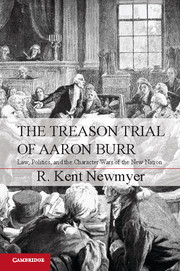Book contents
- Frontmatter
- Contents
- Acknowledgments
- Introduction
- Chronology of the Conspiracy and Associated Trial Proceedings
- Prologue A Mind-Jostling Trial
- 1 Jefferson and Burr on the Road to Richmond
- 2 Jefferson and Marshall Square Off
- 3 Legal Theater in Richmond
- 4 Treason Law for America
- 5 Judging the Judge
- Epilogue
- Index
- References
Epilogue
After the Dust Settled
Published online by Cambridge University Press: 05 October 2012
- Frontmatter
- Contents
- Acknowledgments
- Introduction
- Chronology of the Conspiracy and Associated Trial Proceedings
- Prologue A Mind-Jostling Trial
- 1 Jefferson and Burr on the Road to Richmond
- 2 Jefferson and Marshall Square Off
- 3 Legal Theater in Richmond
- 4 Treason Law for America
- 5 Judging the Judge
- Epilogue
- Index
- References
Summary
“Our Parties will perpetually produce such Characters [as Burr] and such revolutions and as our Legislature and Executive will be always under the Influence of the Prevailing Party, I say We have no Security, but in the total and absolute Independence of the Judges.”
John Adams, February 12, 1808“The courts of justice are the visible organs by which the legal profession is enabled to control the democracy.”
Alexis de Tocqueville, Democracy in AmericaGreat trials of state like the one in Richmond are the stuff of history, but they cannot be expected to settle the historical narrative. Still, such trials are expected to settle certain things: the yes-or-no guilt of the accused; the facts on the ground that called forth the law that brought the accused to court in the first place; and finally the law itself. Ideally, the law should be stated with enough clarity and authority to be accepted by the public as fair and binding.
After months of learned discourse by some of the best lawyers in America arguing before one of its greatest judges, the Burr trial settled none of these – at least none fully and convincingly. Instead of bringing closure and catharsis, the trial as concluded by the enigmatic verdict of the jury perpetuated the debate – about Burr’s innocence or guilt; about Jefferson’s role; about Marshall’s fairness; and indeed about the reliability of the legal process itself. Instead of generating one convincing narrative, the trial generated several – which is why it affords such an intriguing glimpse of early national history. The miracle is that out of the partisan moralizing and character bashing came some legal principles consonant with the fundamental character of the young republic.
- Type
- Chapter
- Information
- The Treason Trial of Aaron BurrLaw, Politics, and the Character Wars of the New Nation, pp. 180 - 214Publisher: Cambridge University PressPrint publication year: 2012

